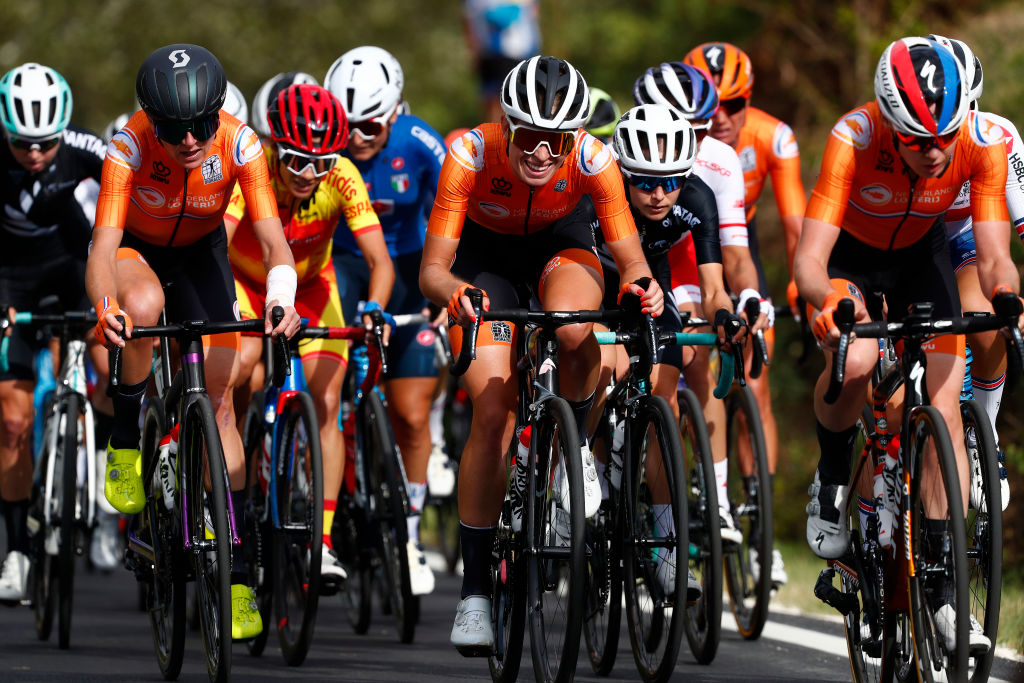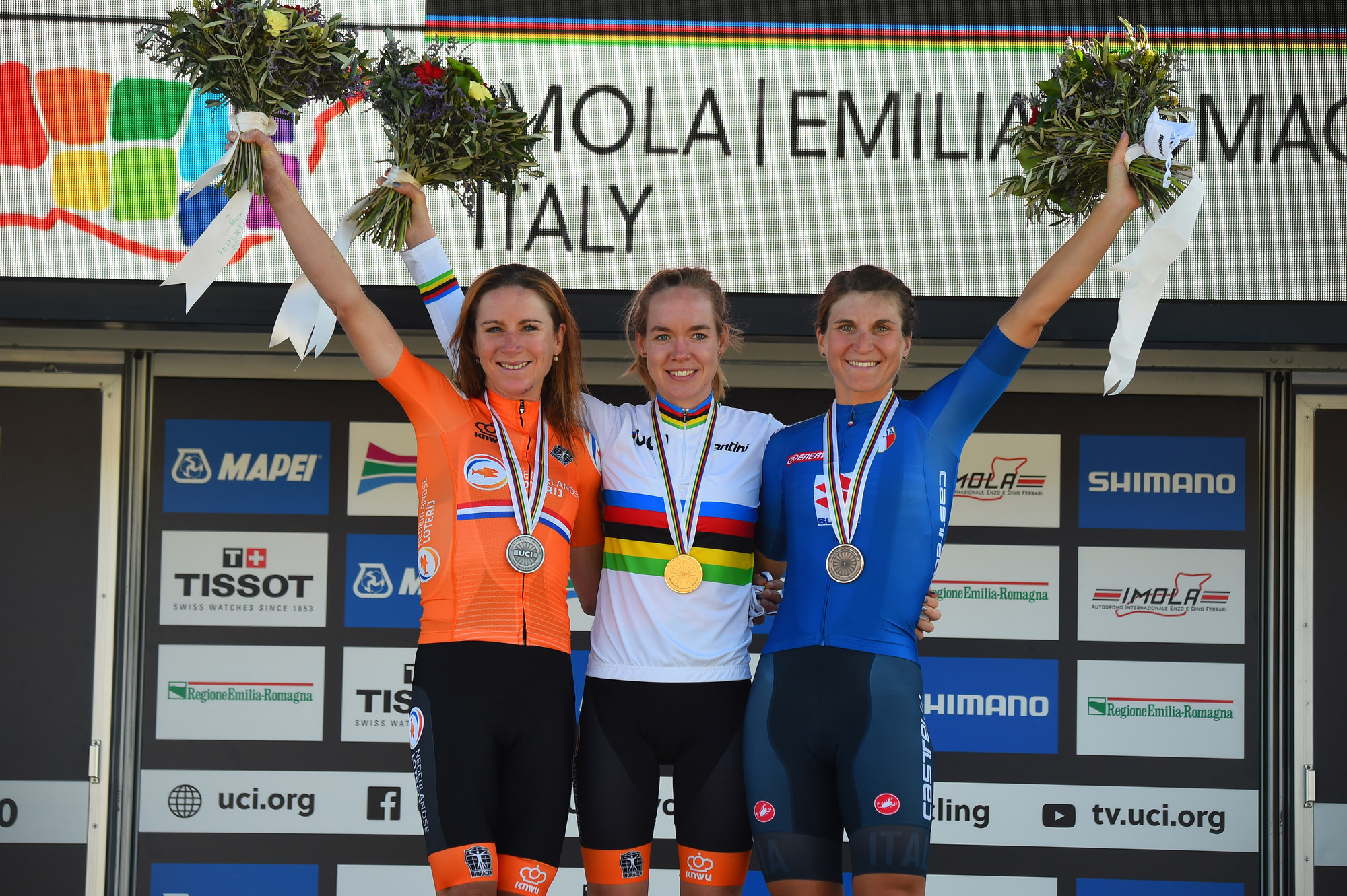Dutch team take valuable lessons from Olympics loss into World Championships
‘We will not let the race get out of our hands again’ says Vollering

The Dutch team will take the lessons they learned from a controversial gold-medal loss in the elite women’s road race at the Tokyo Olympic Games and use it to their advantage at the UCI Road World Championships on September 25 in the Flanders region of Belgium.
Annemiek van Vleuten secured the silver medal in the road race in Tokyo but only after tactical uncertainties and miscommunication led to confusion in the final where she thought she had won, unaware Anna Kiesenhofer (Austria) had survived from the early breakaway and had taken the gold medal. In the end, Kiesenhofer, a powerful time triallist in her own right, rode away with a hard-fought and well-deserved, if surprising, triumph in Tokyo.
In an interview with Cyclingnews ahead of the Flanders World Championships, Van Vleuten said that while the Olympic Games was a completely different race, mainly due to the smaller sizes of the national teams, there was much to learn from that experience.
“We can’t compare Worlds with the Olympic Games at all, because we raced with smaller national teams, for example, there we had four, some nations had one, and here we have eight,” Van Vleuten said.
“We always have an evaluation and lessons learned from that race to take to the next event. We are a team that is always learning and always working to improve.”
The team at the Olympic Games also included Anna van der Breggen, Demi Vollering and Marianne Vos. Those four riders will be joined by Amy Pieters, Ellen van Dijk, Chantal van den Broek-Blaak, and Lucinda Brand at the Flanders World Championships.
Van Vleuten said that they took away some positive lessons as a team after the Olympics, and have already put them to good use at the recent European Championships where Van Dijk won the elite women’s road race from a solo breakaway in Trento, Italy
Get The Leadout Newsletter
The latest race content, interviews, features, reviews and expert buying guides, direct to your inbox!
“At the European Championships, we took some of our communication lessons from Tokyo, to improve. It’s always the big challenge because we don’t have the communications and so if anything was not clear we try to make that better,” said Van Vleuten.
“We managed to make it more clear in the European Championships and we will do the same here at the World Championships. It’s a point of professionalism of the World Championships and the Olympic Games that we have to deal with.”
Communication is one of the most important aspects between officials, riders, and team staff within a bike race, which was reportedly lacking in areas in the women’s road race at the Olympic Games.
The use of in-race radios is not permitted at the Olympic Games, European Championships or the World Championships, as it is when racing with trade teams on the Women’s WorldTour. Riders must instead rely on verbal communication with one another while racing on the road.
It also becomes more important that riders drift back to their support vehicles to get race details from a director, or they can monitor a moto-official’s information written on a whiteboard for the breakaway and peloton to view. Some national teams use their own systems of communication around the circuits to give their riders vital information. The absence of race radio mean riders have to carefully follow what’s happening in the race from inside the peloton.
Demi Vollering, winner of La Course and Liège-Bastogne-Liège, told Cyclingnews that not having race radios presents some added obstacles that are not faced when racing at other events on the international calendar. She said that she has learned to become more focused and relies more on her instincts at races where in-race communication, such as radios, are not permitted.
“No radios at Worlds is odd because normally we always race with radios, and at the biggest races in the world; World Championships and Olympic Games, we do not. Also, we are on a different team with a different coach in the car, so everything is new, and that makes it even more hard. You aren’t used to each other, not as much as your own [trade] teammates, and the coach is new,” Vollering said.
“It makes it hard for communication, to discuss some things, you cannot always go to the car to discuss what is happening out front, or know what to do. In the big races, you really need to ride on your instincts, to be alert and to be focused for the whole race. You need to be able to see everything that happens, or you might miss it. That can be hard.”
Underestimated

The Dutch national team have consistently been the most powerful women’s national team in the world winning the last four consecutive road race world titles with Chantal van den Broek Blaak (2017), Annemiek van Vleuten (2019) and defending champion Anna van der Breggen (2018 and 2020), and before that, the three victories from Marianne Vos (2006, 2012 and 2013).
This year’s 157km route is punchy with technical finishing circuits that will favour powerful riders like Emma Norsgaard (Denmark), Lotte Kopecky (Begium), Coryn Rivera (USA) and Vos.
The Dutch will, once again, field the strongest team on paper but Vollering said that if there’s one thing they learned from their loss at the Olympic Games, it’s that they will not give too much leeway to the early breakaway.
“We won’t let the race get out of our hands anymore. At the Olympics we decided before hand that we could let some riders go, and that once we started racing, we would bring them back anyway. That didn’t happen at the Olympics. We will now be focused on the beginning and will not let a big group go, give them a lot of time, because that could be difficult,” Vollering said.
When the five-rider early breakaway set sail with Kiesenhofer in Tokyo, almost all other nations looked to the Dutch to manage the gap to the breakaway, but they did not. It was rare to see the team relinquish control of a race and it was a questionable tactic, perhaps even an error, that they didn’t field a rider in the early move nor quickly develop an organised chase behind in the main field.
However, the lack of response from the other major nations, that mistakenly relied too heavily on the Dutch team to reduce the gap, allowed the margin to the breakaway to increase to more than 10 minutes.
“It was an eye opener. Everyone thinks we [the Dutch team] will win easily, but it’s not that easy. Women’s cycling is at a strong level and many other riders are also strong," Vollering said.
"Especially at the Olympics, we underestimated the other teams. They were looking at us, and that was hard, and something we underestimated. For the coming races, we will not let the race get out of our hands, especially not at the beginning.
“If there were other countries at the Olympics that really wanted to race for a gold medal, I think it would have been a whole different race. They were really looking to us to do it, so we did nothing, because if we did something we would lose [to them] anyway.
“I think it was a big, important, thing that we underestimated. Now we know and we will not let the race get out of our hands again.”

Kirsten Frattini is the Deputy Editor of Cyclingnews, overseeing the global racing content plan.
Kirsten has a background in Kinesiology and Health Science. She has been involved in cycling from the community and grassroots level to professional cycling's biggest races, reporting on the WorldTour, Spring Classics, Tours de France, World Championships and Olympic Games.
She began her sports journalism career with Cyclingnews as a North American Correspondent in 2006. In 2018, Kirsten became Women's Editor – overseeing the content strategy, race coverage and growth of women's professional cycling – before becoming Deputy Editor in 2023.